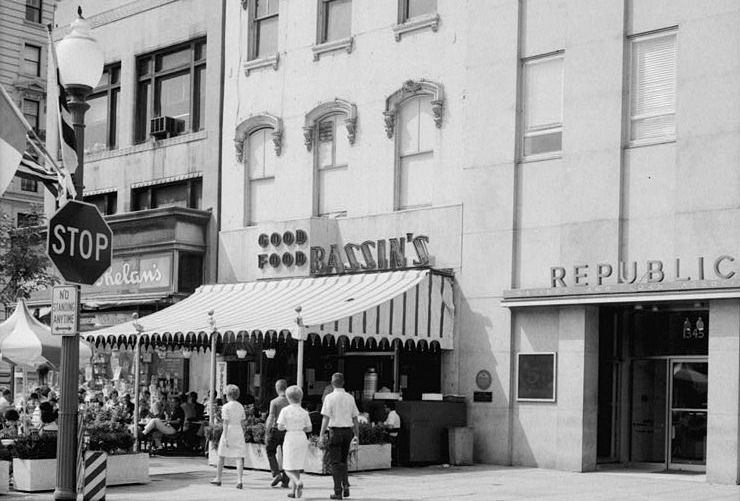
Great Moments in Washington Business: The Sidewalk at Bassin’s
IT’S AUGUST IN Washington, and the livin’ ain’t easy. Under the swelter of the noonday sun, the nation’s capital is moving in shimmering slow-mo. If you walk, you’ll wilt. The subway tunnels are steam baths. Most of the city’s taxicabs — those without air-conditioning — are hell on wheels. The smart folks have gotten out of town.
Had it not been for Harry Zitelman, however, things might be even worse. As a co-owner of Bassin’s Restaurant & Cocktail Lounge, a now-defunct landmark at 14th Street and Pennsylvania Avenue, N.W., Zitelman waged a one-man, two-and-a-half-year battle to open the city’s first sidewalk café. Twenty-six years ago this month, he won.
Until The Sidewalk at Bassin’s opened on the evening of August 9, 1961, in fact, sidewalk cafés were illegal in the nation’s capital. Every now and then the local gendarmes made a show of cracking down on some poor sap who defied the relevant city ordinance. In 1946, for example, they went after Benny Bortnick, a onetime wrestling referee and the proprietor of Benny’s, a popular eatery on the waterfront in Southwest.
Bortnick’s crime had been to sell crabs, hot dogs, watermelon, and peanuts to passersby from an 8-by-33-foot counter in front of his restaurant. Authorities shut down the shacklike projection and slapped Bortnick with a $75 fine.
By 1961, though, thanks largely to Zitelman’s efforts, the attitude of Washington officialdom had softened. At public hearings on the sidewalk café issue, a District commissioner said that “bureaucratic opposition” was the only remaining obstacle. Police department officials, who long had argued that sidewalk cafés would impede pedestrian traffic and endanger public safety, apparently had changed their minds. They even allowed that a little music might be nice, too. “We believe that music soothes the soul,” said a deputy chief, “and we have some souls we would like to have soothed.”
The most strenuous objection to Zitelman’s proposal came from the Organized Bible Class Association, whose executive vice president, H.B. Niece, called it “a Castro takeover” of sidewalk space that was owned by the citizens. What’s more, Niece added, sidewalk cafés would only encourage the operations of such unsavory types as panhandlers and “ladies of easy virtue.”
Nonetheless, within just a few weeks the ribbon was cut at the grand opening of Bassin’s sidewalk café. A strolling accordionist soothed the souls of the 500 or so VIPs who had gathered under and around the café’s red-and-white-striped awning, and television crews were on hand to film the historic event. The only thing missing from the celebration, really, was champagne and cocktails; it would take Zitelman nearly another year to secure permission to serve alcoholic beverages outdoors.
Business boomed at Bassin’s through most of the 1960s, and dozens of other restaurateurs cashed in on the sidewalk café craze. But after the 1968 riots and the closing of the Willard Hotel across the street, things at Bassin’s were never the same. In 1976 Zitelman and his brother, George, sold the business to a wealthy South Vietnamese family for $500,000, and two years later it was destroyed by an early-morning fire that investigators said was
the work of an arsonist.
This article originally appeared in the July 1987 issue of Regardie’s.
